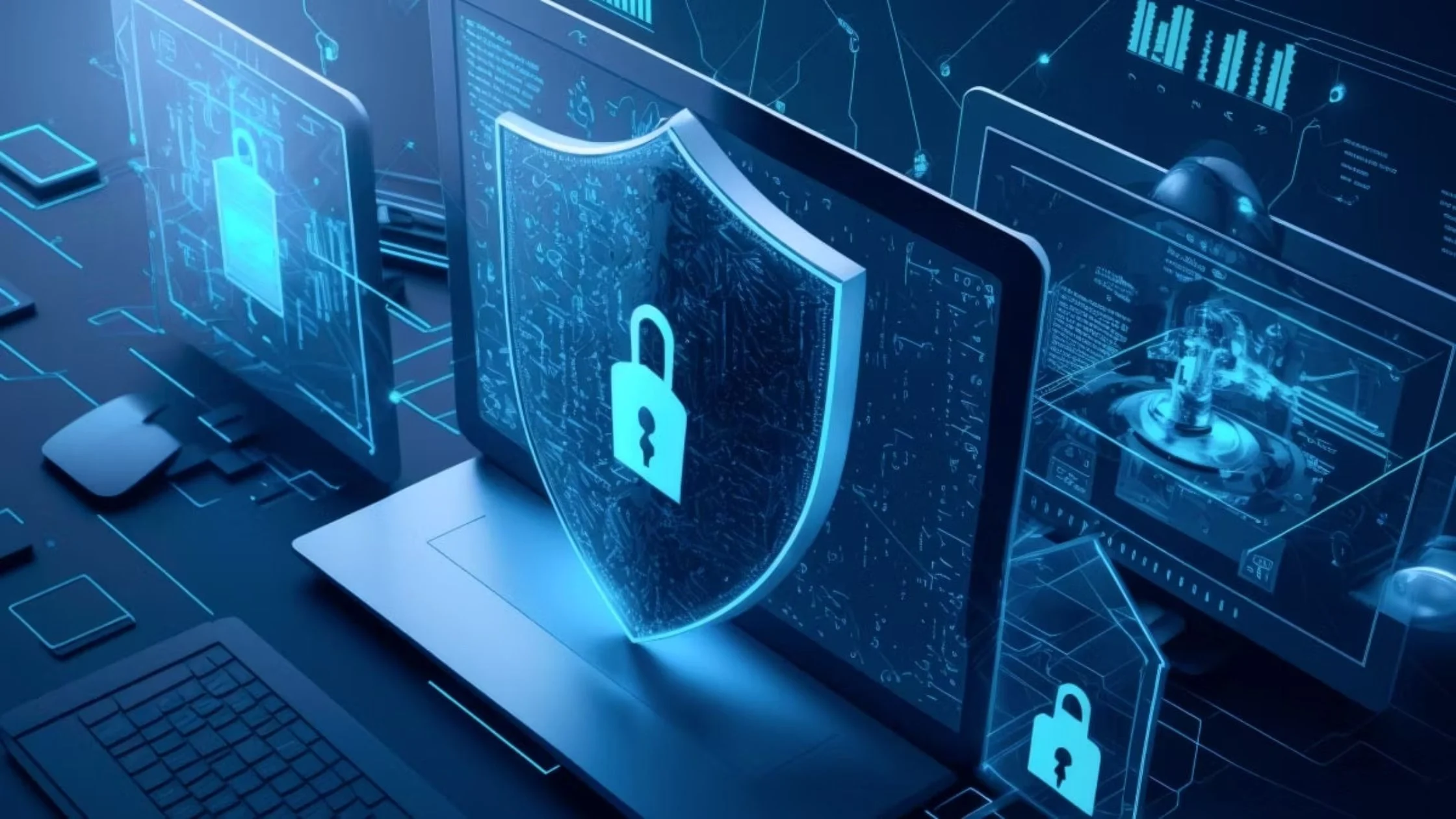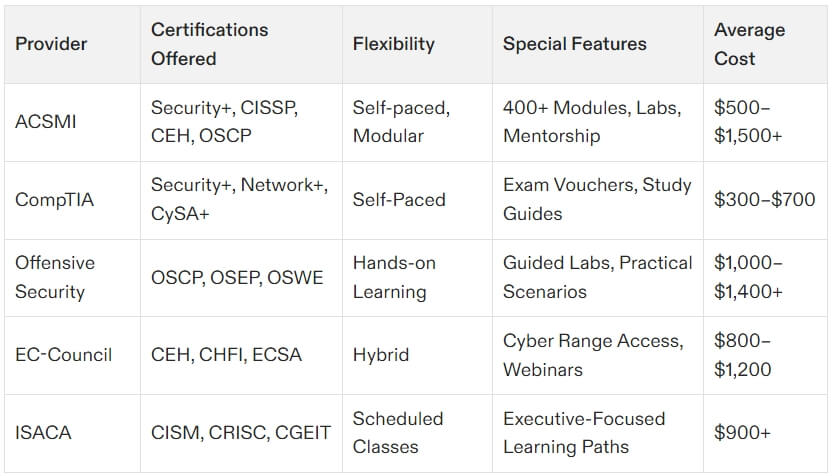Table of Contents
The importance of cybersecurity in today’s digital landscape cannot be overstated. With increasing threats like ransomware, phishing, and data breaches, companies across the globe are in dire need of skilled professionals who can protect their systems and data. But how can YOU stand out in this competitive market? The answer lies in certifications. Earning a certification in cybersecurity not only validates your knowledge but also opens doors to some of the industry’s most sought-after roles. Whether you’re an entry-level enthusiast or a seasoned IT professional, understanding the cybersecurity certification benefits is crucial.
This guide will walk you through the key advantages of obtaining cybersecurity certifications, provide tips for getting started, and show you how platforms like ACSMI, with their 400+ modules, can accelerate your learning.
Why Should You Pursue a Cybersecurity Certification?
cybersecurity certification benefits
Cybersecurity is a rapidly growing field, with thousands of job listings requiring certified professionals. Certification provides more than just a title—it’s a comprehensive learning process that prepares you for real-world challenges. Below, we explore the cybersecurity certification benefits that make this career investment worthwhile.
1. Career Advancement Opportunities
Certifications are increasingly becoming a standard requirement for top-tier cybersecurity roles. Employers value certification as proof of your ability to handle threats professionally and systematically.
For example, certifications like CISSP or CompTIA Security+ often serve as minimum qualifications for job listings, giving you an edge over non-certified candidates. They’re your ticket to higher-paying roles and leadership positions.
2. Increased Earning Potential
One of the prominent cybersecurity certification benefits is the potential for more lucrative job offers. According to industry surveys, certified professionals earn significantly more than their uncertified counterparts—sometimes up to 20% higher. Advanced certifications, such as CEH or OSCP, can boost your salary even further.
3. Industry-Wide Recognition
Certifications demonstrate your commitment to the field and establish your credibility. Industry-recognized credentials such as CISSP, CEH, or CISM signal your expertise to employers, peers, and clients.
Whether you’re in consultancy, government work, or private enterprise, certifications prove you’re up to date with the latest industry standards and techniques.
4. Skill Enhancement
Every certification comes with its own unique set of learning objectives. For instance, CompTIA Security+ focuses on fundamentals like access control and risk management, while certifications like CEH deep-dive into penetration testing and ethical hacking.
By pursuing diverse certifications, you enhance your range of skills, making you a more versatile and in-demand professional. Platforms like ACSMI offer specialized modules for certifications across all levels. Explore ACSMI to begin your skill-building today.
5. Keep Up with Industry Trends
The cybersecurity field is constantly evolving with new threats and technologies. Certifications keep you informed about cutting-edge techniques, such as machine learning in threat detection or zero-trust security architecture.
Programs like those offered by ACSMI, with their 400+ modules, are structured to incorporate the latest industry advancements.
What Jobs Require Cybersecurity Certifications?
Cybersecurity certifications are essential credentials that prepare you for a wide range of job roles, allowing you to progress from entry-level positions to advanced leadership roles. Here’s a closer look at some of the most in-demand roles in the cybersecurity field and the certifications that can help you thrive in each:
1. IT Security Specialist
This role focuses on ensuring the safety of an organization’s IT systems. IT Security Specialists are responsible for monitoring networks, implementing security measures, and responding to incidents. Certifications like CompTIA Security+ and CompTIA Network+ are highly recommended for beginners aiming to enter this field. They cover the foundational skills needed to identify, manage, and mitigate threats.
2. Penetration Tester
Commonly referred to as ethical hackers, Penetration Testers simulate cyberattacks to uncover vulnerabilities in a company’s systems. This role requires hands-on expertise and advanced knowledge of hacking tools and techniques. Certifications like Certified Ethical Hacker (CEH) and Offensive Security Certified Professional (OSCP) are tailored for individuals pursuing this path. These credentials validate your penetration testing skills and ethical hacking methodologies.
3. Cybersecurity Analyst
Cybersecurity Analysts play a pivotal role in shielding organizations from potential threats by analyzing data, monitoring systems, and implementing security measures. If you’re interested in this role, certifications like Certified Information Systems Security Professional (CISSP) and CompTIA Cybersecurity Analyst (CySA+) are highly valued. These certifications demonstrate a strong ability to identify vulnerabilities and design effective security protocols.
4. Security Operations Manager
At a managerial level, Security Operations Managers oversee security strategies, threat analysis, and compliance. They are responsible for planning and directing an organization’s overall security posture. Advanced certifications such as Certified Information Security Manager (CISM) or Certified in Risk and Information Systems Control (CRISC) are often necessary to fulfill the demands of this role. These certifications emphasize management-level expertise in governance, risk, and incident response.
5. Cloud Security Architect
With increasing migrations to cloud platforms, the demand for experts specialized in cloud security has skyrocketed. Cloud Security Architects design security frameworks for cloud-based systems, ensuring data safety in virtual environments. Certifications like Certified Cloud Security Professional (CCSP) or vendor-specific credentials like AWS Certified Security – Specialty are critical for professionals in this niche. They focus on securing cloud solutions and configuring infrastructure for resilience against cyberattacks.
6. Incident Response Specialist
Incident Response Specialists are on the frontlines during security breaches. They identify, manage, and mitigate the effects of cyber incidents while devising strategies to prevent future occurrences. Certifications such as GIAC Certified Incident Handler (GCIH) are tailored for this role, providing professionals with knowledge of advanced incident management techniques and forensic analysis.
7. Cybersecurity Consultant
Cybersecurity Consultants work with clients to analyze their security needs, recommend solutions, and implement strategies to protect their systems. Whether they specialize in small businesses or large enterprises, consultants need versatile certifications like CISSP, CISM, or CEH, depending on the level and focus of their consulting work. These certifications demonstrate proficiency in identifying threats and recommending effective controls.
Each of these cybersecurity careers depends on a strong foundation of skills validated by certifications. Whether you’re looking to specialize in ethical hacking, cloud security, or managerial positions, earning the right certifications is the key to success in this dynamic and rewarding field. Platforms like ACSMI, with over 400+ modules, offer a flexible approach to certification training, ensuring you’re well-prepared for any of these high-demand roles.
How to Get Started
1. Research Your Career Path
Start by identifying your long-term career goals. Do you want to focus on general IT security, or are you passionate about a specific niche like cloud security or ethical hacking?
2. Choose the Right Certification
Select certifications that align with your current knowledge level and your desired job role. Beginners often start with CompTIA Security+, while professionals may target CISSP or advanced penetration testing certificates.
3. Enroll in a Comprehensive Learning Program
Platforms like ACSMI offer customizable pathways to certifications, including hands-on labs and practice exams. Their 400+ modules ensure you’re well-prepared for even the most challenging exams. Learn more about ACSMI certification paths here.
4. Dedicate Time to Practice
Practical experience is as important as theoretical knowledge. Work on labs, participate in cybersecurity forums, or even volunteer to test your skills in real scenarios.
FAQs About Cybersecurity Certification Benefits
“cybersecurity certification benefits”
1. Why are cybersecurity certifications important?
Certifications prove to employers that you have the necessary skills in a field that’s highly complex and dynamic. They also improve your earning potential and set you apart from other candidates.
2. How do certifications enhance career prospects?
Certifications are often prerequisites for job applications and promotions. Earning one signals to employers that you’re committed to professional development.
3. What are the top certifications to start with?
Beginner certifications like CompTIA Security+ or Network+ are great for entry-level positions. If you’re more experienced, consider advanced options like CISSP or CEH.
4. How long does it take to get certified?
The timeline varies depending on the certification and your study schedule. For example, CompTIA Security+ may take a few months of preparation, while CISSP may require a year or more.
5. Are ACSMI’s certifications worth pursuing?
Absolutely! ACSMI provides a robust framework, hands-on labs, and flexible learning options through their 400+ modules, making it an excellent resource for certification seekers.
6. How much do certifications cost?
Costs range from $300 for basic certifications like Security+ to over $1,000 for advanced ones like CISSP. Bundles and subscription services can reduce these costs.
7. Can I pass a certification on the first try?
With proper preparation, including hands-on practice and mock exams, many candidates succeed on their first attempt.
8. What kind of support is available during learning?
Platforms like ACSMI provide mentorship, access to online communities, and live Q&A sessions, ensuring you’re never stuck during your certification prep.
Comparison of Certification Providers
“cybersecurity certification benefits”
Final Thoughts
The cybersecurity certification benefits go beyond just earning a new credential—they open doors to career advancement, higher salaries, and industry recognition. Whether you’re new to the field or an experienced professional, certifications like those offered by ACSMI are instrumental to your success.
With options ranging from foundational learning to advanced, hands-on experiences, ACSMI’s 400+ modules guarantee a well-rounded education tailored to your goals.
Explore ACSMI certifications today and start your cybersecurity career transformation!


Leave a Reply